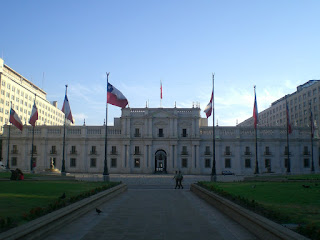President Obama announced his
plan for
bank reform on Thursday.
Some initial thoughts:
(1) The timing, two days after Scott Brown's victory in the Massachusetts Senate race, seemed awkward and reactionary.
(2) If, as it seems today, Congressional Democrats can't pass a market-friendly health care reform that puts guaranteed profits in the hands of insurance companies, I'm skeptical about their resolve in the face of almost certain fierce lobbying from JP Morgan, Goldman and others.
(3) I'm not sure how, in reality, you can limit exposure to under 10% in every conceivable area that may be problematic, but I'm very interested in seeing more details. If actually enforced, it would very likely limit the risk of another LTCM or AIG or Bear Stearns moment of pure systemic panic. I doubt it would limit the risks of, say, the dot-com bubble or the real estate bubbles. When everyone's long on an asset that later turns out to be overvalued, it doesn't matter that the risk is spread out among all of us. But it would reduce the risk of "LTCM moments," for sure, which would be a net plus.
(4) The other part of the plan, make no mistake, is nothing short of a return to Glass-Steagall rules, abandoned with bipartisan support in 1999 at the apex of deregulation and the Greenspan era. Again, in reality, I'm not sure how you distinguish the use of deposits for single-family loans on the one hand, and the use of deposits for more exotic securities, on the other. I'm not sure I see a bright line as between prop trading and "traditional" banking activity. Regional banks are failing all over the country and they made conservative (or so they thought) investments in traditional banking investments. I'd prefer perhaps a revision of the capital ratios, or regulations that place mortgages and mortgage-backed securities on equal footing vis-a-vis capital ratios (One of the regulatory nudges that caused the panic was the banking rule that banks could have much more leverage, in terms of capital, if they invested in mortgage-backed securities rather than underlying mortgages, thereby creating an incentive towards the former).
(5) Also make no mistake that this really could mean a dismantling of Wall Street -- get ready for banking to flow to Hong Kong, Dubai, and (maybe) London -- and all the tax revenue that's been fueling the renaissance of New York City.
(6) Alternatively, having lived in an era without Glass-Steagall, it may be difficult to put the genie back in the bottle. Talent will flow out, our capital markets could become less dynamic, or we'll end up with odd international joint ventures that are flexible enough to avoid full regulation by any one national authority. Furthermore, although it's an unpopular argument, financial innovation can be a good thing -- there are valid uses for credit default swaps. They make markets more efficient in some cases -- for example, total return swaps are a tool to separate ownership and the beneficial incidents of ownership. On the other hand, there's validity in the notion that the financial/securities industry may have become too juiced, and that there are better uses, in terms of comparative advantage, of the best and brightest talent out of U.S. universities than a beeline to Wall Street.
(7) To the extent investment banking talent does remain in NYC, that talent will flow to other as-yet unregulated shops like hedge funds and private equity. I'm not optimistic that the Congressional package of regulation shepherded by Barney Frank will really clip the wings on those unregulated groups sufficiently to tame capital markets in the way that these new "Obama/Volcker" reforms are designed.
(8) It's great to see Paul Volcker being taken seriously by the Obama administration.






